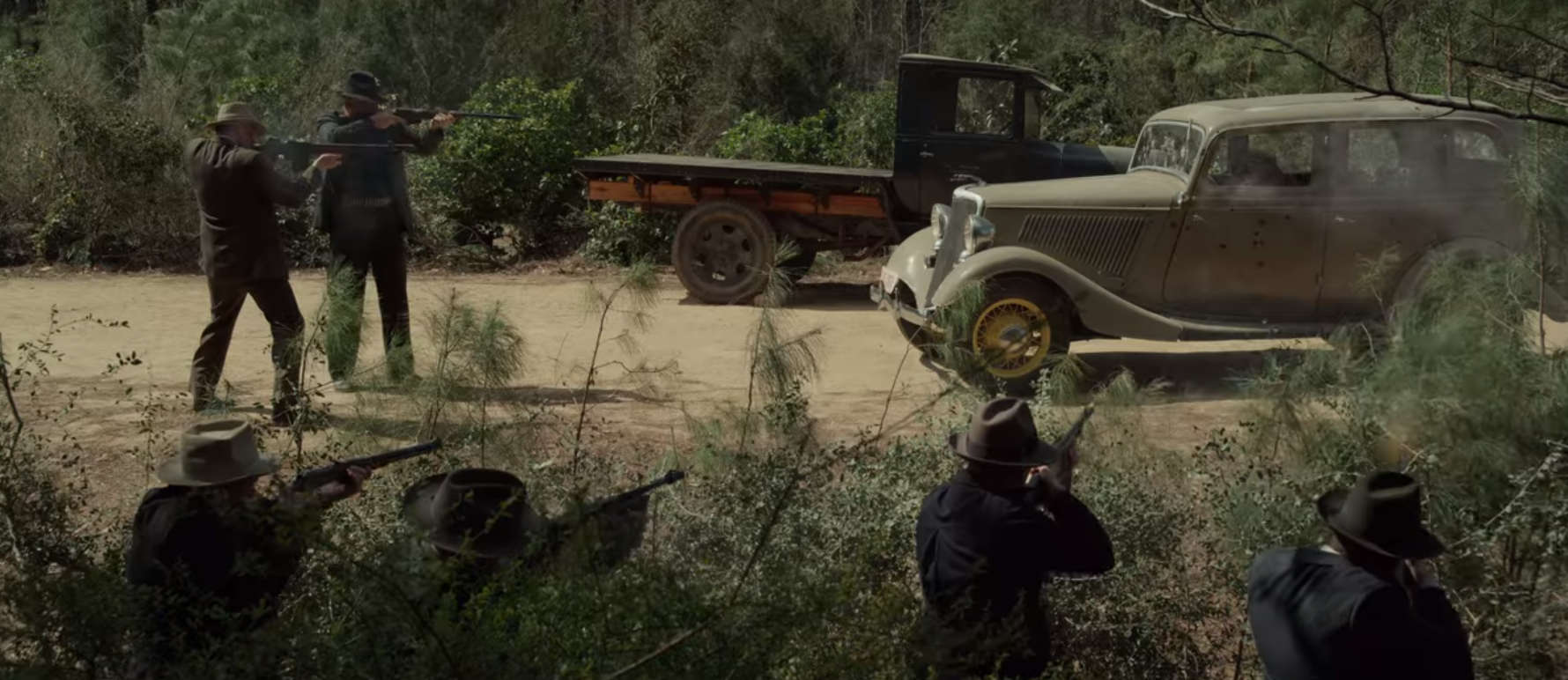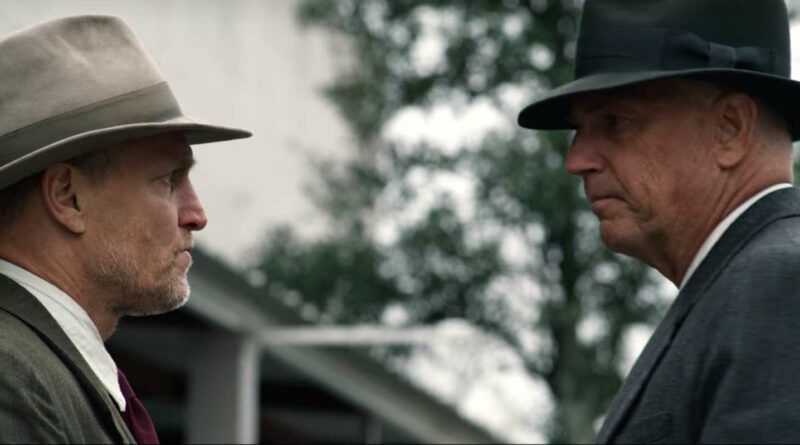The Highwaymen, a Recognition of the Mission and Costs of Law Enforcement.
“The Highwaymen,” a gripping cinematic portrayal of the pursuit of Bonnie and Clyde, takes viewers on a journey through the untamed heartland of 1930s America. This film provides a fresh perspective on a well-known tale, shifting the focus from the notorious outlaws to the relentless law enforcement officers tasked with bringing them to justice. In this thrilling narrative, Frank Hamer and Maney Gault, portrayed by Kevin Costner and Woody Harrelson, are called out of retirement to track down the infamous criminals. The film weaves a story that not only captures the high-stakes cat-and-mouse chase but also explores the complex moral landscape of law enforcement. As we delve into their pursuit, ‘The Highwaymen’ pays homage to the dedication and sacrifices made by those who stand between the public and chaos, ultimately serving as a powerful tribute to law enforcement.
At the heart of the film stands Frank Hamer, a legendary and retired Texas Ranger, portrayed with gravitas by Kevin Costner. The film introduces him as a man deeply familiar with the harsh realities of law enforcement, carrying with him the wisdom and scars of a long and storied career. It’s when the Texas Governor, Ma Ferguson, offers him an unexpected opportunity to come out of retirement that Hamer’s world is once again thrust into action. Initially reluctant, Hamer’s reasons for ultimately accepting the job are rooted in his unwavering sense of duty and moral obligation. He recognizes that his unparalleled experience and knowledge of the criminal landscape could be instrumental in finally bringing the notorious criminals, Bonnie and Clyde, to justice. The film paints a vivid picture of a man who cannot ignore his calling and who understands that the mission at hand is more than just a job; it’s a solemn responsibility to protect society from the chaos and violence inflicted by the criminal duo.
Frank Hamer’s purchases at the gun store reflect his determination to be well-armed for the pursuit of Bonnie and Clyde. He acquires a formidable arsenal, including a Colt M1911 .45 pistol, a Smith & Wesson 1917 revolver, a Browning Automatic Rifle (BAR), a Colt Monitor semi-automatic rifle, and a Thompson submachine gun. Additionally, Hamer picks up a 1903 rifle equipped with a scope for precision shooting and a Remington 11 shotgun in 12 gauge for close-quarters combat. These purchases illustrate the diverse range of firepower that Hamer believes will be necessary to confront the notorious criminals, showcasing his meticulous approach to the mission.
Frank Hamer’s extensive purchases of firearms reflect a real-world phenomenon seen among some modern law enforcement officers who are often referred to as “gun enthusiasts” or “gun nuts.” In both the film and real life, there are a few reasons for this affinity for weapons: for law enforcement officers, firearms are essential tools of the trade, just as Hamer recognized the importance of having the right equipment for the job. They face diverse threats and acquire a variety of firearms to be prepared for different scenarios, while their passion for shooting sports and marksmanship often extends to collecting and using firearms both on and off duty. Firearms also serve as a focal point for camaraderie and training among officers, who understand the importance of safety, preparedness, and responsible firearm ownership in fulfilling their duty of keeping communities safe. Frank Hamer’s arsenal in “The Highwaymen” serves as a cinematic representation of this culture, which continues to be relevant in modern law enforcement.
In an unexpected turn of events within the film, Frank Hamer, portrayed by Kevin Costner, initially decides not to recruit Maney Gault, recognizing the heavy toll that past experiences have taken on his former partner.
From the confines of his car, Frank Hamer watched in silence as Maney Gault, his former partner, walked his grandson to the road on his way to school. The scene was a poignant reminder of the passage of time and the weight of their shared history. As they stood by the roadside, Gault’s grandson looked up at him, his innocent curiosity revealing a depth of understanding beyond his years. The young boy remarked that Gault was somewhat famous, recounting how one of his schoolmates had pointed out that Gault might go to Hell for all the people he’d killed. This statement, innocent and direct, seemed to hang in the air, encapsulating the complex emotions surrounding Gault’s past. For Gault, the horrors of the Candelaria incident had left him scarred, and the trauma lingered like a shadow. In the midst of the Great Depression, his lack of employment compounded his struggles, creating a personal hell of sorts in a world filled with economic despair and a relentless memory of the past. The silent observation from Hamer’s car captured the essence of the characters, each dealing with their own burdens and the consequences of their chosen paths in a changing and challenging world.
However, Gault, played by Woody Harrelson, takes matters into his own hands. Outside the gun store, he confronts Hamer and passionately demands to be part of the mission to capture Bonnie and Clyde. Gault’s insistence is driven by a mix of loyalty, unresolved trauma, and the desire to rekindle their partnership and face their shared history head-on. His determination to join the pursuit, despite Hamer’s reluctance, adds a layer of complexity to their characters and their evolving dynamic throughout the film, ultimately bringing two crusty lawmen back into action against the notorious criminals.
Frank Hamer and Maney Gault’s motivations for embarking on the mission to pursue Bonnie and Clyde differ, reflecting their distinct backgrounds and personal struggles. Hamer’s return is driven by his competence as an officer, his wealth of experience, and his unwavering commitment to justice. He accepts the mission because he believes he is the right man for the job, recognizing that his skills are needed to end the criminals’ reign of terror. In contrast, Gault’s decision to join the mission is tinged with a different kind of urgency. Having once been a skilled mechanic, the Great Depression’s grip on the economy has left him unable to find work in his former trade. This unfulfilled longing to contribute, coupled with the haunting trauma from his past, drives Gault’s sense that this mission might be the only thing he is truly good at. In a world where joblessness and desperation abound, Gault clings to the opportunity to reclaim his self-worth and make a difference, even if it means confronting the darkest chapters of his own history.
Modern police officers often persist in their careers despite the inherent challenges, trauma, and political pressures that come with the job. They persevere not only because of their unique ability to navigate this demanding and often unforgiving profession but also because they genuinely feel it is their calling to be protectors of society. Policing is a role that demands a rare blend of skills and qualities, including courage, empathy, quick decision-making, and adaptability in the face of ever-evolving threats. While the path may be fraught with personal sacrifice and emotional toll, the understanding that they can make a difference, keep communities safe, and uphold the law fuels their commitment. It’s a vocation that not everyone can embrace, and yet, for those who answer the call to protect and serve, the sense of duty and responsibility remains unwavering, transcending the many complexities of the profession.
The film portrays Frank Hamer and Maney Gault as embodying tried and true policing methods that ultimately make a pivotal difference in the pursuit of Bonnie and Clyde. While federal agencies are busy processing crime scenes and taking photographs, Hamer and Gault remain unwavering in their commitment to relentless pursuit. Their reliance on traditional, street-smart investigative techniques proves invaluable. They follow the trail with a persistence that underscores the enduring value of experienced lawmen who understand that, in the end, it’s the dogged pursuit of justice, rather than bureaucratic processes, that leads to success. The film highlights that sometimes, it’s the boots on the ground and the pursuit of leads that make all the difference in bringing notorious criminals to justice.
Frank Hamer and Maney Gault’s relentless pursuit leads them to an invaluable discovery that Bonnie and Clyde are hiding out in Louisiana, specifically at the home of Ivy Methvin. This crucial breakthrough narrows down the lawmen’s search, bringing them closer than ever to their elusive targets. The discovery not only adds intensity to the pursuit but also highlights the significance of keen investigative work and unwavering determination.
In a poignant moment Maney Gault is questioned by one of the Dallas officers about his history of taking lives. Gault opens up about the deeply troubling Candelaria incident, where he and his fellow Rangers repeatedly attempted to gain the bandits’ compliance with the command “Manos ariba” (hands up). Each time, their efforts were met with deadly violence, with the bandits refusing to surrender and killing the lawmen in return. Gault shares the haunting reality of those experiences, how the only option they had was to take action when the bandits were intoxicated and vulnerable. The weight of the trauma and the lives lost in that intense confrontation still burdens Gault’s conscience, but he recognizes the harsh necessity of their actions. This scene underscores the profound complexities of law enforcement work, where officers sometimes face harrowing choices in the line of duty, and where the consequences of those decisions can continue to affect them deeply.
Frank Hamer and Maney Gault engage in a conversation within the context of their meticulous preparations, building a hide to conceal themselves alongside Texas and Louisiana law enforcement officers. Amid the tension and anticipation that envelops them, Hamer confides in Gault, revealing his intention to spare his partner from the emotional weight of taking another life, a burden Gault has grappled with due to past traumatic experiences. Hamer’s acknowledgment of Gault’s inner demons and his heartfelt words, “I’m real glad you’re here,” resonate as the highest praise within the law enforcement brotherhood. It reflects the profound trust, mutual respect, and shared history between these two seasoned lawmen, underscoring their unbreakable bond as they prepare for the impending confrontation with Bonnie and Clyde. This affirmation signifies the unwavering camaraderie and confidence that they place in each other in the face of the dynamic and challenging situations that their profession demands.

In a gripping and climactic scene, Hamer’s instruction to Gault to wait on the side of the road serves as a poignant setup for the final confrontation. As Hamer steps onto the road to confront Bonnie and Clyde, he commands “stickum up!” Gault’s decision to defy this command and join his partner in the road speaks to the deep bond and loyalty that has defined their partnership throughout the film. Gault’s action is a testament to the unwavering camaraderie they share and the profound trust they have in one another. In this high-stakes moment, all the lawmen unleash a barrage of fire, resulting in a relentless and fatal hail of bullets against the infamous outlaws. Gault’s choice to stand by Hamer symbolizes the unbreakable connection between the two men, ultimately playing a pivotal role in the dramatic and resounding conclusion to their pursuit of justice.
The portrayals of Maney Gault and Frank Hamer in this film serve as powerful reminders of the enduring dedication and sacrifices made by law enforcement officers throughout history. Their relentless pursuit of justice against Bonnie and Clyde reflects the challenges faced by modern-day officers who, on a daily basis, engage in the hard, underappreciated work of maintaining law and order in our society. Gault and Hamer’s motivations, rooted in the call to protect their communities, are echoed in the commitment displayed by countless officers today. “The Highwaymen” pays a heartfelt tribute to these individuals, highlighting the unwavering spirit, camaraderie, and sense of duty that bind law enforcement officers across generations. In a world where the thin blue line continues to stand between chaos and order, the film serves as a timeless salute to the resilience, heroism, and sacrifices made by officers who, like Gault and Hamer, choose to protect and serve, regardless of the challenges they may face.

